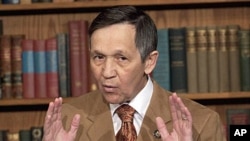President Barack Obama and Democratic leaders in the House of Representatives are working feverishly this week to try to solidify the minimum 216 votes needed to pass sweeping health care reform legislation. Undecided lawmakers are feeling the pressure, with some House members getting telephone calls from the president, leading to one prominent Democratic lawmaker changing his mind in favor of the measure.
All eyes were on Ohio Democrat Dennis Kucinich, who called a news conference on Wednesday. Kucinich is known as one of the most left-leaning members of Congress and as an ardent supporter of nationalized health care. He had voted against the health care reform bill passed by the House in November, saying that did not go far enough to protect Americans from unfair practices by health insurance companies.
Kucinich became the first member of Congress to announce that he was changing his vote. "I've decided to cast a vote in favor of the legislation," he said.
Kucinich said even though he still does not like the bill that was passed by the Senate, he realizes that the vote in the House is going to be very close, calling it a historic opportunity to "do something" to improve Americans' access to affordable health care.
Kucinich ran against then-Senator Obama for the Democratic presidential nomination in 2008, and admitted that they have their differences. But Kucinich said he realizes that the health care vote could be crucial for Mr. Obama's presidency.
"We have to be very careful that the potential of President Obama's presidency not be destroyed by this debate. And I feel even though I have many differences with him on policy, there is something much bigger at stake here for America," he said.
President Obama aggressively pursued Kucinich's vote, meeting with him four times and traveling with him to his Cleveland, Ohio district earlier this week for a rally on health care. In Ohio, the president spoke passionately about Americans like Natoma Canfield, a cancer patient there who was forced to give up her health insurance because of sharp premium increases.
"When you hear people saying that this isn't the "right time", you think of what she's going through. When you hear people talk about, 'Well what does this mean for the Democrats, what does this mean for the Republicans,' I don't know how the polls are doing, when you hear people who are more worried about the politics of it than what's right and what's wrong. I want you to think about Natoma and the millions of people all across this country who are looking for some help and looking for some relief. That's why we need health insurance reform, right now," the president said.
The U.S. Senate was consumed with health care reform for much of last year, passing it on Christmas Eve, after the House of Representatives passed its own version.
Congress must send President Obama one bill. House Democratic leaders want that chamber to approve the Senate's bill, which would be modified later with changes contained in a separate measure.
Democrats need 216 votes for passage in the House. And they are considering using a procedural rule that would allow lawmakers to pass changes without a direct vote on the unpopular Senate version.
Democratic leaders and President Obama are aiming for a vote before week's end. The president already postponed his Asia-Pacific trip to lobby lawmakers to pass the bill plan, so it can be signed into law by Mr. Obama before it goes back to the Senate.
Senate Democrats plan to pass the separate package of changes -- including funding the measure -- using a procedure that would allow approval with only a simple 51 vote majority.
Republican lawmakers, who are united in their opposition to the health care legislation, have denounced the procedural maneuver as a dirty trick.
Republican House Minority leader John Boehner led the charge. "I don't care what trick they try, it is not going to work. This is the biggest vote that most members will ever cast. You can't hide from it! And the American people will never accept some trickery to try to make this bill become law," he said.
House Speaker Nancy Pelosi has rejected all accusations that the procedure is against the rules, noting that Republicans have used it many times themselves - although not for legislation as sweeping as health care reform. "And I didn't hear any of that ferocity when the hundreds of times the Republicans used these methods when they were in power," she said.
Republicans have jumped at the chance to renew their criticism of the health care bill, saying that it is too big, too expensive, and inserts government bureaucrats into Americans' health care decisions.
Republican Representative Mario Diaz-Balart of Florida expressed his distaste for the legislation. "The big bill itself - that is not a solution, that is a dog. It is a flea-infested, tick-infested, parasite-infected, special interests-infected, wet, smelly dog! We don't need that in order to deal with some issues that the American people agree on," he said.
An NBC News/Wall Street Journal public opinion poll this week indicates that Americans are sharply divided over the legislation President Obama is pushing Congress to approve, with 46 percent in favor of the measure and 45 percent opposed to it.
The president says that at this point in the long debate, he wants Congress simply to vote "Yes" or "No" on health care reform.









